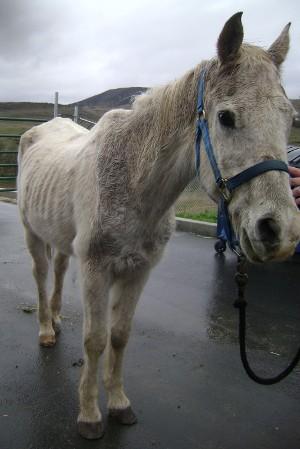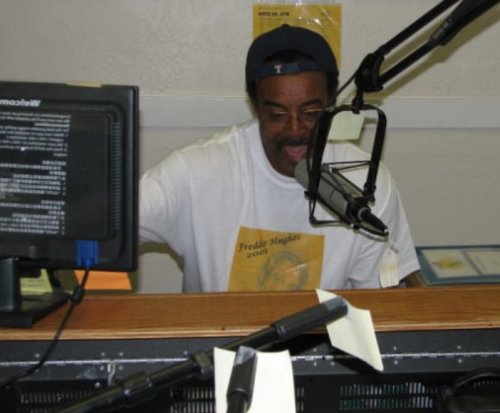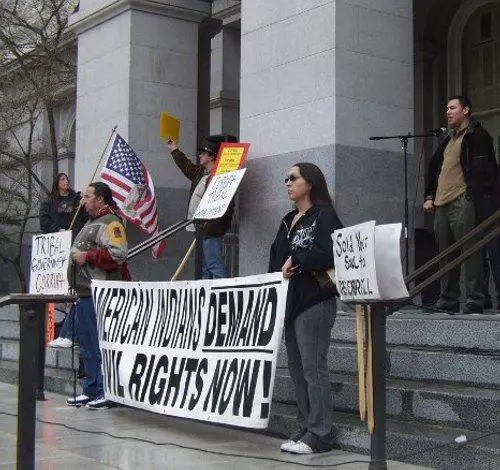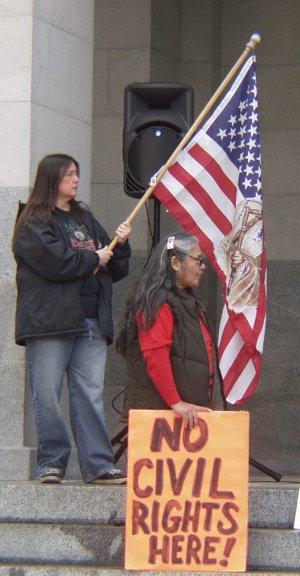
Upper Lake High School's Academic Decathlon team, along with Principal Patrick Iaccino (left) celebrate their win on Saturday, February 7, 2009, at the Lake County Academic Decathlon. Photo by Elizabeth Larson.
MIDDLETOWN – Four teams, 45 excellent students and four coaches met Saturday in Middletown to compete for the honor of being this year's county Academic Decathlon champ. {sidebar id=120}
After the pencils were down and the brain dust had settled, Upper Lake High School – led this year by new coach Anna Sabalone – took the prize, with Lower Lake High right on their heels, along with Clear Lake and Middletown high schools.
Lake County Superintendent of Schools Dave Geck emphasized that all of the teams and students were winners, worthy competitors who deserved honors for the work they'd done – from months of preparatory study on the subject of Latin America, to the Saturday competition.
Saturday was the culmination of a lot of work, and was just the last step in the competition. Nancy Harby, Lower Lake High's coach, said the essay, speech and interview portions of the competition were held late last month.
That left yet another seven subjects for Saturday – language and literature, fine arts, social services, mathematics, music, economics and the Super Quiz.
The Super Quiz was the only portion of the competition open to the public. Close to 70 family and community members – in addition to the students, coaches and officials – crowded into the Middletown High School multipurpose room to see the quiz play out.
Over about 50 minutes, the student teams worked through 45 questions, with each student getting five questions that focused on evolutionary biology, the Super Quiz theme.
Genetics, alleles, neuropeptides, natural selection, the Galapagos finches studied by Charles Darwin, scientific techniques for tracking the age of the universe and more questions that would make a Jeopardy contestant flinch were read by Middletown Principal Bob Roderick. Roderick, the quiz's moderator, was given props for weathering through the tricky pronunciations of the names of evolutionary scientists and the complicated terminology.
First up in the Super Quiz were Varsity Division students, with grade point averages ranging from 2.99 GPA and below.
After the test proctors had tallied the results of the first 15 questions, Upper Lake led with seven points, followed by six for Clear Lake High and Lower Lake High, and five for Middletown.
Then came the Scholastic group (GPAs of 3.0 to 3.74) and another 15 questions which seemed to get harder and more technical with each round. The scoring update showed that Upper Lake still led, with 13 points, with Lower Lake at 12, and Clear Lake and Middletown with nine points each.
The Honors Division (GPAs of 3.75 to 4.0) was the last to sit down for the quiz. After that final round of 15 questions, Upper Lake and Lower Lake were tied with 17 points each, followed by a second tie between Middletown and Clear Lake, which each scored 14 points.
Then it was time to wait.
With the Super Quiz scores in hand it was up to the judges to tally the final results, a process which took about a half hour.
Students chatted, fretted, checked their cell phones and sent texts. Harby pointed to senior Emmalena Illia's nervously tapping foot as signs of the nerve-wracking wait. Illia said the competition seemed about as hard as her two previous visits to the Academic Decathlon.
Then Geck was back at the microphone, telling everyone it was time to announce the results, which had been delivered to him in sealed envelopes by Robin Totorica of the Lake County Office of Education.
Geck called up the principals of the four competing high schools – Patrick Iaccino of Upper Lake, Steve Gentry of Clear Lake, Bob Roderick of Middletown and Jeff Dixon of Lower Lake – to help with handing out the awards.
Before awarding the medals and trophies, Geck took a minute to respond to a question posed to him by a parent during the break.
The question had been about the future of the Academic Decathlon in light of the state's budget crisis.
Geck was frank. He told the roomful of proud parents and grandparents and their students that the realities of the state budget and thinning resources will make it harder for school district boards to sustain programs like the Academic Decathlon.
His suggestion: Let legislators know that the Academic Decathlon is valued and should continue.
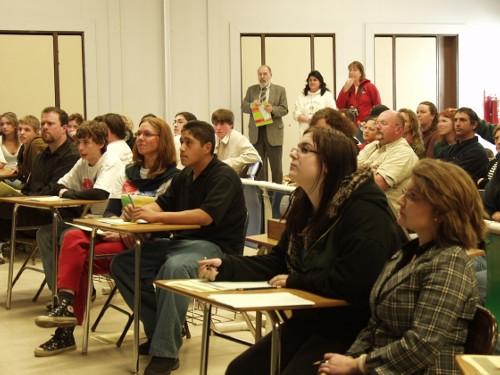
Scholastic Division students take part in the Super Quiz, the theme of which was evolutionary biology. Photo by Elizabeth Larson.
Geck then moved to the happier news of the awards.
The following is the list of award-winning students.
Written essay
Bronze: Grace Evans, Honors, Middletown
Silver: Ben Mullin, Varsity, Upper Lake
Gold: William Oertel, Varsity, Middletown
Interview
Bronze (four-way tie): Marilou Montanez, Honors, Lower Lake; Joe Riggs, Scholastic, Lower Lake; Kevin Boyd, Scholastic, Lower Lake; Marisa Feliciano-Garcia, Scholastic, Upper Lake
Silver: Ben Mullin, Varsity, Upper Lake; Emmalena Illia, Honors, Lower Lake
Gold: Alma Martinez, Varsity, Lower Lake
Speech, impromptu
Bronze: Marisa Feliciano-Garcia, Scholastic, Upper Lake
Silver: Ryan Wilson, Scholastic, Lower Lake
Gold: Natasha Gibbs, Honors, Middletown
Language and Literature
Bronze: Ryan Wilson, Scholastic, Lower Lake
Silver: Ben Mullin, Varsity, Upper Lake
Gold: Joe Riggs, Scholastic, Lower Lake
Fine Arts
Bronze: Thonyoon Chao, Scholastic, Upper Lake
Silver (three-way tie): Ben Mullin, Varsity, Upper Lake; Stephanie Tregea, Scholastic, Upper Lake; Joe Riggs, Scholastic, Lower Lake
Gold: Emmalena Illia, Honors, Lower Lake
Social Science
Bronze: Garrett Schofield, Honors, Clear Lake
Silver: Ben Mullin, Varsity, Upper Lake
Gold: Joe Riggs, Scholastic, Lower Lake
Mathematics
Bronze (three-way tie): Nycole Copping, Honors, Clear Lake; Marisa Feliciano-Garcia, Scholastic, Upper Lake; Thonyoon Chao, Scholastic, Upper Lake
Silver: Belarmino Garcia Jr., Honors, Upper Lake
Gold: Kyle Coleman, Honors, Upper Lake
Music
Bronze (tie): Desiree Quiett, Varsity, Middletown; Marisa Feliciano-Garcia, Scholastic, Upper Lake
Silver: Belarmino Garcia Jr., Honors, Upper Lake
Gold (tie): Stephanie Tregea, Scholastic, Upper Lake; Ben Mullin, Varsity, Upper Lake
Economics
Bronze (three-way tie): Alma Martinez, Varsity, Lower Lake; Grace Evans, Honors, Middletown High; Marisa Feliciano-Garcia, Scholastic, Upper Lake
Silver: Chae Carter, Varsity, Upper Lake
Gold (tie): Ben Mullin, Varsity, Upper Lake; Joe Riggs, Scholastic, Lower Lake
Varsity top scorer
Bronze: Brandon Rockwell, Lower Lake
Silver: William Oertel, Middletown
Gold: Ben Mullin, Upper Lake
Scholastic top scorer
Bronze: Kevin Boyd, Lower Lake
Silver: Marisa Feliciano-Garcia, Upper Lake
Gold: Joe Riggs, Lower Lake
Honors top scorer
Bronze: Diego Bernardino, Clear Lake
Silver: Emmalena Illia, Lower Lake
Gold: Kyle Coleman, Upper Lake
Top scoring student from each school
Clear Lake High School: Diego Bernardino, Honors
Upper Lake High School: Ben Mullin, Varsity
Middletown High School: William Oertel, Varsity
Lower Lake High School: Joe Riggs, Scholastic
Super Quiz
Silver: Lower Lake High School
Gold: Upper Lake High School
Then it was time to announce the winner.
“We know that you're all working hard,” Geck said before making the announcement.
Winning the silver was Lower Lake, with Upper Lake taking the championship. Each of the teams received standing ovations.
The full point tallies for all the schools was not available from officials late Saturday.
Afterward, there were a lot of hugs, high fives and congratulations for the teams.
“We did it!” Sabalone and a student said to one another.
“They did fantastic,” she said of her students.
She called it a “nerve-wracking and exhilarating” experience that followed a grueling final week of preparation, with students arriving at school at 7 a.m., going through classes and then studying together until 9 p.m., with parents bringing in food to the evening study sessions.
Sabalone saw the competition from the coach's side this year. While a student at Upper Lake, she competed as an academic decathlete. She said at first she was less nervous than when she was a student competitor.
But she eventually ended up worrying about other things. “When it comes down to it I wonder, did I do enough?”
Looking ahead, she said two-thirds of her team is graduating this year, but she has a lot of students coming up through the ranks who are showing potential.

The jingliest of them all: Ben Mullin of Upper Lake brought in 11 medals during Saturday's Academic Decathlon in Middletown. Photo by Elizabeth Larson.
Regarding the budget concerns Geck referred to during the awards ceremony, Sabalone said she doesn't know if the budget will hurt the Academic Decathlon, but she plans to go on with the program “with or without a budget.”
When it comes to keeping Upper Lake's Academic Decathlon program going, “I plan on finding a way,” Sabalone said.
She said she's looking forward to the state competition and to the final point tally, so they know which areas need extra work.
The students have a three-day weekend to enjoy and then Sabalone is giving them a week off to rest up before they begin the furious month of preparation for the 30th annual California Academic Decathlon, which takes place March 13 through 16 in Sacramento.
E-mail Elizabeth Larson at This email address is being protected from spambots. You need JavaScript enabled to view it..
{mos_sb_discuss:2}

 How to resolve AdBlock issue?
How to resolve AdBlock issue? 



